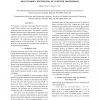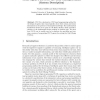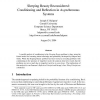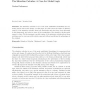875 search results - page 85 / 175 » Reasoning about Knowledge and Continuity |
AUSAI
1997
Springer
15 years 2 months ago
1997
Springer
Abstract. We compare Kripke models and hypercube systems, a simpli ed notion of Interpreted Systems, as semantic structures for reasoning about knowledge. Our method is to de ne a ...
ICIP
1995
IEEE
15 years 1 months ago
1995
IEEE
We introduce a projection based multi-channel restoration method which is useful in cases for which there is no a priori information about the input signal. The method is especial...
103
click to vote
CLIMA
2006
14 years 11 months ago
2006
FLUX is a declarative, CLP-based programming method for the design of agents that reason logically about their actions and sensor information in the presence of incomplete knowledg...
CORR
2004
Springer
14 years 9 months ago
2004
Springer
A careful analysis of conditioning in the Sleeping Beauty problem is done, using the formal model for reasoning about knowledge and probability developed by Halpern and Tuttle. Wh...
JOLLI
2010
14 years 8 months ago
2010
Abstract The situation calculus is one of the most established formalisms for reasoning about action and change. In this paper we will review the basics of Reiter’s version of th...




